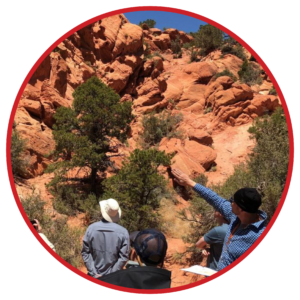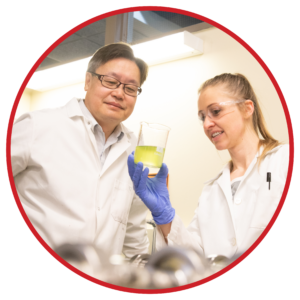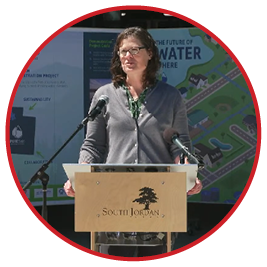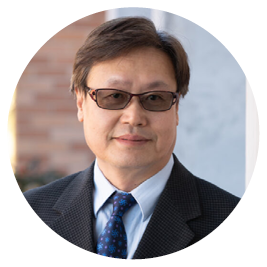Environmental Engineering
Pioneering Sustainable Solutions for a Better Tomorrow
Proudly part of a tier-1 research institute, our faculty specializing in Environmental Engineering are dedicated to addressing the most pressing environmental challenges of our time. Our cutting-edge research spans across multiple disciplines — from wastewater reclamation to reducing CO² emissions — combining innovative technologies and interdisciplinary collaboration to help build the future more sustainably.
Working within and throughout academia and industry, Environmental Engineering researchers at the U work to improve public health and quality of life, while protecting and restoring environmental systems.
Research Areas
Drinking Water Treatment
Environmental Remediation
Solid Waste Management
Air Pollution Control
Wastewater Reclamation
Our Impact
Our environmental engineering research has a far-reaching impact, from influencing policy decisions to driving innovation in industry. We collaborate with governmental agencies, non-profits, and private sector partners to ensure that our research findings translate into real-world applications. By bridging the gap between academia and practice, we are making a tangible difference in the world.
$35 Million in Department of Energy Grants to Transform Utah's Carbon Storage Landscape
What if Utah could lead the charge in addressing climate change by capturing millions of tons of carbon emissions? What if we could boost local economies and transform rural communities in the process? Three major grants secured by CvEEN faculty will contribute to the DOE’s carbon emission reduction initiative, an effort focused on managing carbon emissions in Utah and throughout the United States.

At the Forefront of New Nanobubble Technology
Peculiarly powerful, nanobubbles have opened a new frontier in science and engineering, creating promising environmental and medical applications.
In collaboration with Dr. Lewis and Dr. Fleming of the University of Utah Health Sciences and fellow Environmental Engineering professor Dr. Jennifer Weidhaas, Dr. Hong has a patent pending for this new and innovative energy-efficient process.

NSF Awards $500,000 Collaborative Grant for Innovative Research Led by Dr. Weidhaas
Chronic diseases, a major cause of preventable deaths in the U.S., are often linked to air pollution, which is known to exacerbate asthma, respiratory diseases, and other health issues. Dr. Weidhaas’s research is pioneering preventative solutions to mitigate these preventable deaths.
By analyzing air pollution metabolites found in urine, researchers can directly confirm human exposure to pollutants and the magnitude of health effects.
Over $10 Million from Department of Energy to Support Reducing CO2 Emissions in Uinta Basin
Dr. Ting Xiao and Dr. Brian McPherson are currently engaged in a comprehensive project focused on carbon capture, utilization, and storage (CCUS) hubs. Their work is part of the CarbonSAFE II: Storage Complex Feasibility initiative, which aims to determine the viability of commercial CO2 storage in Utah’s Uinta Basin.
Granted in large part by the Department of Energy, to project will support an extensive range of activities, including high-resolution societal analysis, geological characterization, technical assessments, economic evaluations, and environmental analyses.

$500,000 National Science Foundation Grant for Dr. Goel's Wastwater Treatment Research
Dr. Ramesh Goel received a National Science Foundation grant for more than $500,000 in June of 2023 for his work toward energy efficient waste water treatment. The project is titled GOALI: Understanding Granulation Using Microbial Resource Management for The Broader Application of Granular Technology.
In collaboration with an industrial partner, DC Water, this academia-industry collaboration will generate a new body of knowledge related to full-scale applications of granular technology based on fundamental research and Dr. Goel’s track record in activated sludge systems, nutrient management, granular technology and omics.

Dr. Ramesh Goel
State-of-the-Art Research Labs
Our tier-1 research institute is equipped with state-of-the-art laboratories and facilities that support groundbreaking environmental research. These include advanced simulation and modeling labs, water and air quality testing centers, and renewable energy laboratories. Our students and faculty have access to the latest technologies and tools to conduct their research.
Dr. Ramesh Goel is an environmental engineering professor in the CvEEN department. His teaching interests are courses that address environmental engineering and science related issues, such as: environmental engineering I, the environmental lab and bio process design. Dr. Goel’s research is focused on the application “omics” the importance of bacteriophages in engineer bioreactors and natural ecosystems, nutrient recovery from urban rest streams, as well as many other topics addressing the environmental and water.
Dr. Andy Hong teaches environmental engineering courses along with engineering economics and statistics. He seeks to apply innovative processes in contaminant issues, particularly for treatment of contaminated water, soil, and sediment, for which 10 US patents have been issued. Dr. Hong is currently working on applications of micro/nanobubbles for harmful algal blooms, bioenergy, and viral disinfection.
Dr. Weidhaas’ research and teaching interests include environmental engineering with a particular emphasis on biological processes and the fate and transport of contaminants and microorganisms in the environment. Her recent projects include evaluation of emerging contaminants in environmental systems, industrial wastewater treatment, waterborne pathogen detection and wastewater reuse. She also conducts research in the area of environmental microbiology including microbial source tracking, development of massively parallel pathogen detection methods, and evaluation of microorganism fate in environmental systems.




